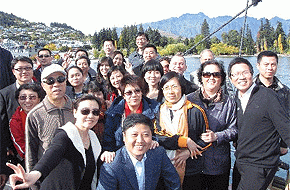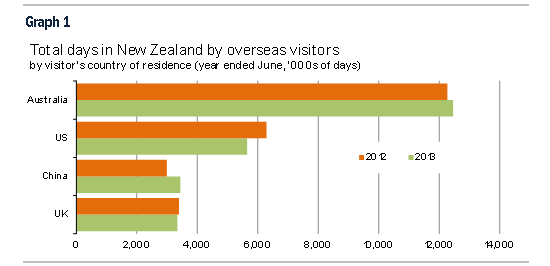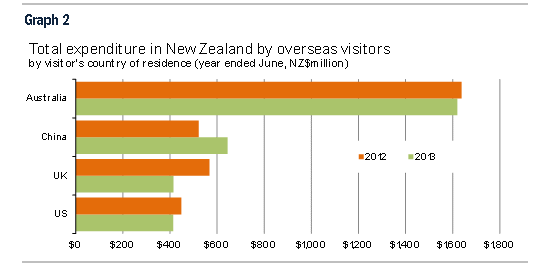
By Benje Patterson*

International visitor arrivals figures released last month show that inbound tourism is running at a record level.
Over the year to July 2013, there were 2.65 million overseas visitor arrivals, 0.4% more than the previous record a year earlier when tourist numbers were boosted by the hosting of the Rugby World Cup.
However, despite this rising tide of foreign visitors, many tourism operators are still crying that times are tough.
A quick glance through the recently released International Visitor Survey (IVS) shows that these complaints aren’t just idle whinging – a change in the composition of where tourists are coming from is having a profoundly negative effect on the underlying level of tourist spending in New Zealand and altering what they spend their money on.
According to the IVS, total expenditure in New Zealand by international visitors[1] over the year to June 2013 was $5.49 billion, 1.3% less than the $5.57 billion spent by visitors the previous year (and significantly less than in 2008 when spending was pushing $6 billion per annum).
Dissecting this result further shows that the fall in visitors’ total spend was caused by three factors:
1) an increase in the number of visitors who stay here for a short period of time (arrivals from Australia and China tend to fit this category)
2) a decrease in the number of visitors who stay for a prolonged period of holidaying (arrivals from nations such as the US and parts of Europe tend to fit this category)
3) more frugal daily spending patterns by tourists once they are in New Zealand.
The remainder of this article, examines these factors in turn, before focusing on issues affecting the outlook for business operators in the tourism sector.
More Chinese and Australian visitors
The composition of where tourists are coming from has changed significantly over the past five years.
In the year to June 2008, visitor arrivals from our four biggest markets: Australia, the UK, the US, and China constituted 39%, 12%, 8.8%, and 5.0% respectively of total visitors to New Zealand. However, by June 2013, rapid growth in arrivals from Australia and China had pushed up their shares of visitors to 45% and 8.5% respectively, while the UK and US both saw their shares fall to 7.2%.
Visitors from these major markets stay for vastly different periods of time on average. The median length of stay for Australians (7 days) and Chinese (4 days) is far less than for visitors from the UK (20 days) and the US (9 days). Median stay lengths for visitors from Australia and the UK were unchanged from a year earlier, while over the past year median stays rose from 3 days to 4 days for Chinese visitors and fell from 10 days to 9 days for US tourists.
This changing composition of where visitors are coming from has reduced the total number of days spent in New Zealand by foreigners. According to the International Visitor Arrivals survey, overseas visitors spent 3.0% fewer days in New Zealand over the year to June 2013 than they had a year earlier, despite visitor arrival numbers rising to a record level. Graph 1 illustrates this change.

Furthermore, not only have total visitor days in New Zealand eased, but visitors have been displaying more frugal spending patterns once they are in New Zealand. The reasons for this spending restraint include: The strong New Zealand dollar eroding the value of budgets set in foreign currencies and more cautious attitudes to spending amidst a fragile global economic backdrop.
Over the past year, median daily spending has fallen across many of New Zealand’s key tourist markets. The median daily spend of Australian visitors fell 9.1%, while for UK visitors it fell by 19%. US visitors spent 11% more per day than a year earlier, but daily spending remains 9.2% below its level from the year to June 2010 when a stronger US dollar boosted American tourists’ purchasing power.
Although the median Chinese spend per day fell heavily (down 29% over the past year), their median spend per trip fell a more moderate 5.0%. It appears that Chinese travellers on package tours more or less fix a budget for their trip and so an increase in median stay length (from 3 to 4 days) simply meant that this budget was stretched more thinly.
Combining this information on falling median daily spends with the data presented above on total days spent in New Zealand helps to explain why total expenditure by overseas visitors fell by 1.3% over the past year (see Graph 2). Of New Zealand’s key markets, only total spending by Chinese tourists increased, as a massive surge in arrivals from China more than offset any frugality in Chinese spending patterns.

What this means for tourism operators
This changing composition of visitor arrivals and spending patterns has been a double-edged sword for the tourism industry.
Not only has the total volume of spending been under downward pressure, but the fact that visitors have been spending fewer days in New Zealand has left them with less time to visit more remote parts of the country.
At present, there are very few spots outside of Auckland and Queenstown/Wanaka to have seen international guest nights rise materially above their pre-Global Financial Crisis level.
Even guest nights in Rotorua remain at a low level, as many Chinese tour groups choose to visit the region as a day trip from Auckland instead of overnighting. In most parts of the country, international guest nights remain 10% to 30% or more below their pre-Global Financial Crisis levels.
With these trends in mind, it is not surprising that many tourist operators in regional New Zealand are doing it tough.
The five years since the beginning of the Global Financial Crisis (GFC) have been extremely trying for tourist operators in regional New Zealand who cater towards longer-staying self-guided tourists from Europe and North America. However, once European and North American economies return to more normal health, there is no reason that arrivals from these parts of the world won’t recover to their pre-GFC level. This recovery will take some time, but at least those operators who have weathered the storm are leaner and more efficient than they were before the downturn and will be well poised to capture any pick-up.
On the other hand, tourism businesses fortunate enough to be exposed to the lift in arrivals from Australia and China have been enjoying permanent structural improvement. Cut-price air travel across the Tasman, as well as a growing number of New Zealand citizens residing in Australia coming home to visit family, are helping to boost arrivals from Australia. At the same time, inbound tourism from China has soared, as the rapid expansion of the Chinese middle class has increased demand for overseas travel to places like New Zealand.
But unfortunately, Chinese tourism has not been a golden ticket for all domestic tour operators. Even though visitor arrivals from China are continuing to grow rapidly, spending by Chinese tourists is still highly concentrated on a small subset of enterprises. This concentration of spending occurs because of the highly-structured nature and short duration of Chinese tours, coupled with anecdotal concerns regarding cronyism between Chinese tour operators and certain retail outlets.
At present, the majority of Chinese visitors arrive on group tours which only include New Zealand as a three or four-day add on to an Australia trip. These group tours are favoured due to a more streamlined visa process. However, if visas for independent travel are made more accessible then median stay lengths and, in turn, the range of regions which Chinese tourists visit and the activities they partake in will broaden.
Even so, to ensure they capture this increased custom, tourist businesses will still need to adopt new practices to satisfy Chinese visitors’ different cultural and linguistic background. I am not necessarily talking about reinventing the wheel, but following up a “kia ora” with a friendly “ni hao” would certainly be a good start !
[1] Expenditure figures pertain to travelers aged 15+ and exclude international airfares.
--------------------------------------------------------------------------------------------
Benje Patterson is an economist at Infometrics. You can contact him here »
14 Comments
Here's a reason why spending could be down.
Everything is to expensive and on tours too many are clipping the ticket.
This why so many kiwis head offshore for their breaks.
Completely agree, the prices in NZ are astronomical at the current exchange rates for any tourist visiting NZ from europe, USA or UK.
Used to be that the ticket to NZ was the biggest cost, but once you were there the costs where cheaper than back home so you could stay for a while.
Now its expensive to get to NZ and depressingly expensive when you arrive, no wonder the Europeans and Brits aren't coming.
So the tourrists that spend money are replaced by package chinese torists on short term property buying trips who pre book from home.
thats right and the bench mark survey show those that stay longer and spend more money.. frequent travell independently and stay at motels rather than hotels which usually owned by small kiwi business...
Friend visiting Melbourne for a week, went to a local health food shop in the local village to get some voodoo-potion they needed .. cost of NZ equivalent in NZ in NZD $52.00, cost of same product in Melbourne AUD $9.00
As long as the currency stays high, the tourists who spend time her and therfore money will stay away as they have woken up to how little their Euro's, Pounds and US dollars get these days.
But its all good as we can keep selling wooden tents (NZ houses) to each other at ever higher prices to keep us all wealthy, don't need any pesky tourists.
Of course the cronyism you mention is there. Chinese tourists travel using Chinese owned transport, to Chinese owned shops, buying Chinese Jade trinkets produced in China, to Chinese owned accommodation and eateries. The only ticket NZ clips is the GST one, so long as the sale was rung up on the till. Sorry, but that is about the sum total of it.
I have had donkey's years in the tourism industry (accommodation mostly) and I do have some idea of what I speak. It's been going on for years only it used to be the Japanese before they got out of the buses and onto their bikes, now it's the Chinese, but they are doing even more comprehensively than the Japanese
Regarding your comments on the Chinese owned transport, Chinese owned shops, Chinese Jade trankets, Chinese owned accommodation etc above,
1. DO YOU SUGGEST that those Chinese businesses are not a part of NZ economy because they are run by Chinese even if they are residents or citizens? Only businesses that owned and run by white people are considered NZ owned/run even if they may not be residents or citizen?
2. Do you blame for the business acumen displayed by Chinese businessmen/women for attracting more customers, while fail to adapt your business model to a different world?
My comments will be that your business will go no where by blaming others.
Yes that is exactly what is being suggested and its got nothing to do with the colour of skin although you seem to always bring it up. Its to do with structure and whether the spend gets tourist spend gets recirculated back into the local economy or is repatriated back to China.
Its not a race issue, the same complaint is made about Aussie banks where the profits get repatriated rather than recirculate in the local economy,
Stop making out that every critism of Chinese business practise is racist, its becoming quite tiresome
I'm afraid that not all Aussies have NZ residency or citizenship but I bet all Chinese businessmen/women mention by Raegu have NZ residency or citizenship.
So, you are truely compare foreigners and local.
Regarding your comments 'every critism of Chinese business ', now, you also admit that somehow Raegu's comments is critiizing Chinese businesses. Have you asked yourself. Why the fxxx does he single Chinese out?
Fighting against any sort of racism is never tiresome. Always prepare for that.
Jeez get over yourself xing, yes, Chinese and doubtless others are exploiting OUR NZ tourism industry. Look at the recent decision of DoC's to cease to stock NZ made possum products from a small producer in favour of Chinese made stuff. I am not anti-Chinese I am pro NZ and if you are NZ of Chinese extraction that inludes you!!
Hopefully the average Chinese tourist eventually gets sick of some of these rip off tours and does what a lot of Japanese people did - got off the buses and into their own cars and on their own bikes and see the country their own way. Those are the sorts of tourists we enjoy best. Get yourself down to the west coast or somewhere similar and go and order a beer at the local pub and you might begin to get a grasp of what I am talking about.
I actually feel sorry for the poor tourists whisked around on a bus only getting to see what the tour operator decides they should see, collecting the back handers on the way.
BTW I used to grrrrr under my breath every time someone who had hired a well known Aussie firms campervan, came to me for help at reception because the damned thing leaked like a sieve - didn't have to be that water tight in Oz you see
I think the site would benefit from more guest articles by prominent business people & politicians ....
... Bob Jones would be a hoot , Shane Jones , someone from Samsung or Apple .... that sort of thing ... not just Kiwis ... others who know what they say and do , and Australians as well .. ...
Cruise shipmarket seems to have trended to becoming the haunt of cost conscious Aussies. Friend runs a shop for a clothing chain which specialises in expensive and quality. Previously it was generously purchasing Americans. Last year or two it has been Aussie couples, with lots of huddled conversations about expenditure. Usually with no purchase resulting.
The unforseen consequences of the strong Kiwi$.
Even American toursits complain of the prices here . We had family visit us from North America and they were blown away at the cost of things .
Did anyone hear the interview on the Edge this morning with an American complaining how expensive his trip to Hobbitton was?
How can things be expensive here, dollar isn't high and inflation is only 1-2%. ;)

We welcome your comments below. If you are not already registered, please register to comment
Remember we welcome robust, respectful and insightful debate. We don't welcome abusive or defamatory comments and will de-register those repeatedly making such comments. Our current comment policy is here.